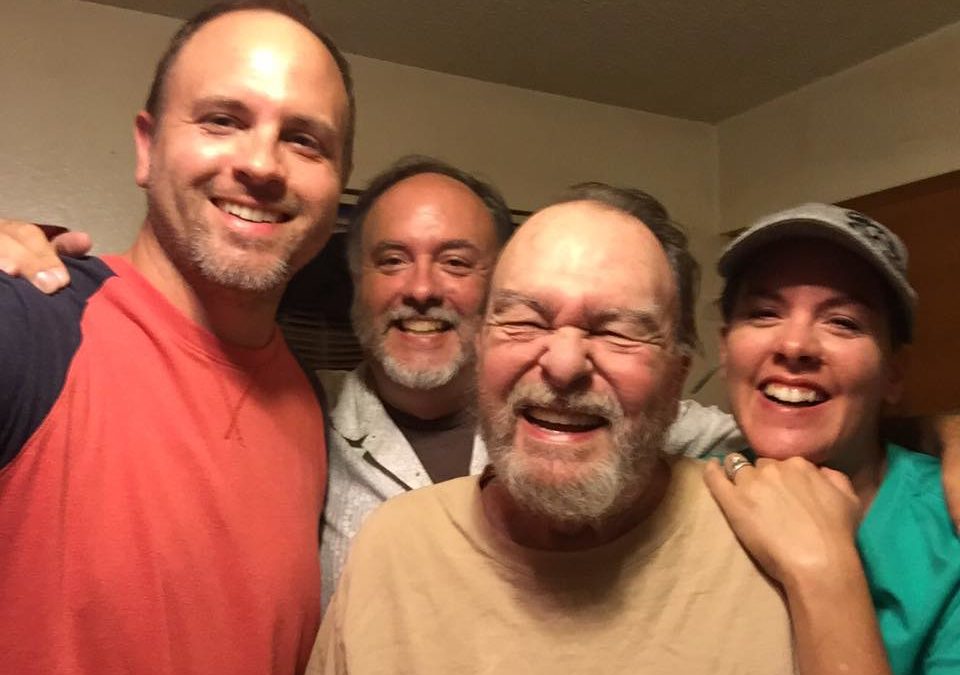Should we accept the classic five stages of grief? Or are there others? Can you integrate and accept them more easily if you’ve already been through them before? Is it necessary to wallow in grief all the time? Can you make a choice to reframe grief as gratitude? Or are we just making way too big a deal out of it all?
 Back in college, before my Mom died, I took a class called “On Death and Dying” which was based on Elizabeth Kubler-Ross’s book from 1969. I knew the stages of grief, and knew what the person who was dying was likely to go through. Then my Mom died suddenly and unexpectedly in 1997 and the only stages I knew were shock and utter despair. Pretty sure I’m still in the utter despair stage 20 years later. I just set it aside because… life. Not long after Mom died, I became exhausted from crying every day. It took me an entire week before I could go one minute without thinking about her. Seriously. Not even one minute. I cried almost constantly. It was awful.
Back in college, before my Mom died, I took a class called “On Death and Dying” which was based on Elizabeth Kubler-Ross’s book from 1969. I knew the stages of grief, and knew what the person who was dying was likely to go through. Then my Mom died suddenly and unexpectedly in 1997 and the only stages I knew were shock and utter despair. Pretty sure I’m still in the utter despair stage 20 years later. I just set it aside because… life. Not long after Mom died, I became exhausted from crying every day. It took me an entire week before I could go one minute without thinking about her. Seriously. Not even one minute. I cried almost constantly. It was awful.
When Dad died in September, my experience was vastly different. I remember telling a friend “I don’t want to cry every day. It’s exhausting. I’ve already done that. No thank you.” I mean, you can’t help but to grieve at least a little, but I just don’t want to wallow in it. People seem to find that concept unrealistic. There are five stages of grief after all. Pick one, go through them and then you can stop. Or at least be seen as having recovered properly. Or something. But my experience today is different than what’s expected.
 I have realized that when I look back on memories of Dad (or even Mom), I cry not because I miss them as much as I cry because I loved that time so much. So isn’t that a form of gratitude and love rather than sadness and loss? It’s true that even the most mundane days become a big deal when you remember them after someone has died. I’m reminded of the play “Our Town” where Emily goes back to relive a day in her life. The other dead people warn her to pick an ordinary day, that it will be enough. But she choses a childhood birthday and is overwhelmed with how amazing it is. “Does anyone ever realize life while they live it…every, every minute?”
I have realized that when I look back on memories of Dad (or even Mom), I cry not because I miss them as much as I cry because I loved that time so much. So isn’t that a form of gratitude and love rather than sadness and loss? It’s true that even the most mundane days become a big deal when you remember them after someone has died. I’m reminded of the play “Our Town” where Emily goes back to relive a day in her life. The other dead people warn her to pick an ordinary day, that it will be enough. But she choses a childhood birthday and is overwhelmed with how amazing it is. “Does anyone ever realize life while they live it…every, every minute?”
Death makes you realize how important even the average little parts of life are. But we can’t beat ourselves up over not being grateful every second of every day. We have to live – we have things to do. But I suppose we can be grateful for a bit more of those mundane moments. And I suppose we can look at grief as a gift in that way. But you can’t be grateful for anything if you’re too busy wallowing in grief. So I think there should be a gratitude stage of grief for the survivors.
 When Dad was in hospice I wished we had put a camera up in the corner of the room so that we could run it at a fast speed and show all the visitors who came by (some repeatedly). There would also be a lot of laughing on that video. I wondered if the staff thought that we kids were about to inherit a lot of money because we were always laughing and joking around (we didn’t). Which stage of grief is that? I find laughing just as effective as crying to release tension and strain. In fact, I think I prefer it.
When Dad was in hospice I wished we had put a camera up in the corner of the room so that we could run it at a fast speed and show all the visitors who came by (some repeatedly). There would also be a lot of laughing on that video. I wondered if the staff thought that we kids were about to inherit a lot of money because we were always laughing and joking around (we didn’t). Which stage of grief is that? I find laughing just as effective as crying to release tension and strain. In fact, I think I prefer it.
Also, where is the “void” stage of grief? That point at which everything is finally calm and you can just relax. I’m there. The last year was such a roller coaster that I’m just zoning out now so my brain and emotions can recover.
So, I’m looking at the Kubler-Ross stages of grief: denial, anger, bargaining, depression, acceptance, and I’m pretty sure I skipped to the end or something. Apparently I’m not doing it right, because my stages of grief are these:
Stress
Worry
Temporary Reprieve (Repeat)
Laughter
Gratitude
The Void
But those are just the ones for Dad. The ones for Mom are just: shock, utter despair.
I’m pretty sure the old stages of grief don’t really apply. We can try to use them as a tool for creating compassion and understanding, but that’s it. I don’t see any benefit in going through those stages myself. I also don’t see any benefit in telling someone else they are doing it wrong. You grieve if you want to. You grieve as long as you need. I’m on year 20 for Mom. But I’m not going to live there every minute. That’s just my personal choice. It’s too draining for me.
But I do think that at some point you have to be okay with being okay. You still have a life to live and things to appreciate before it’s your turn to go. It doesn’t mean you love them any less if you don’t cry and think about it all the time. If my kids do that, I’m coming back to haunt them. Or at least leave them a message to “knock it off” as my Dad would say. Or whatever. Maybe I’ll just let them grieve however they want.
And you can do the same.

Our Town Photo Credit Photofest


Recent Comments